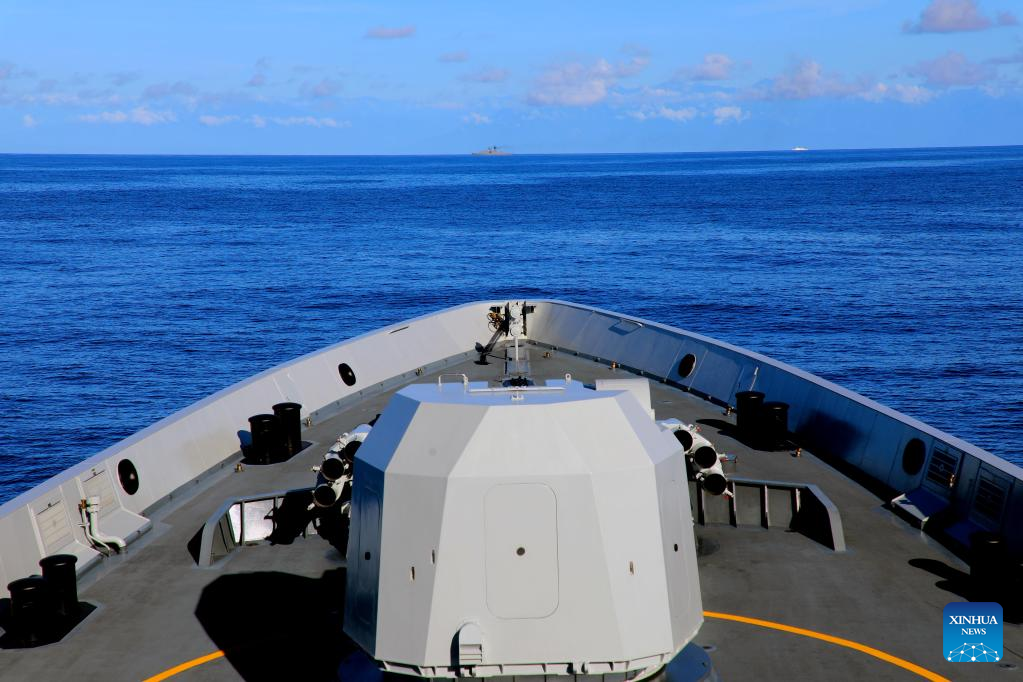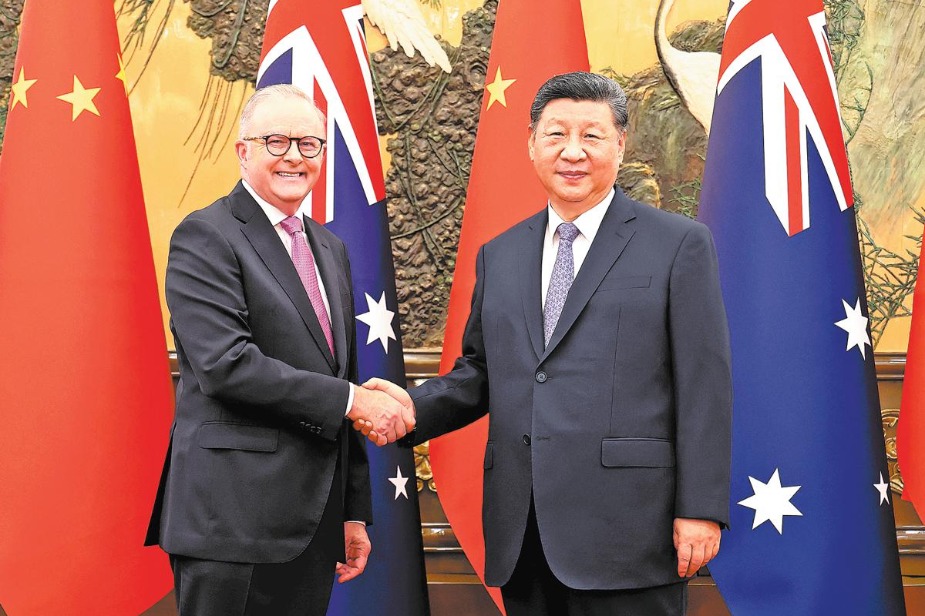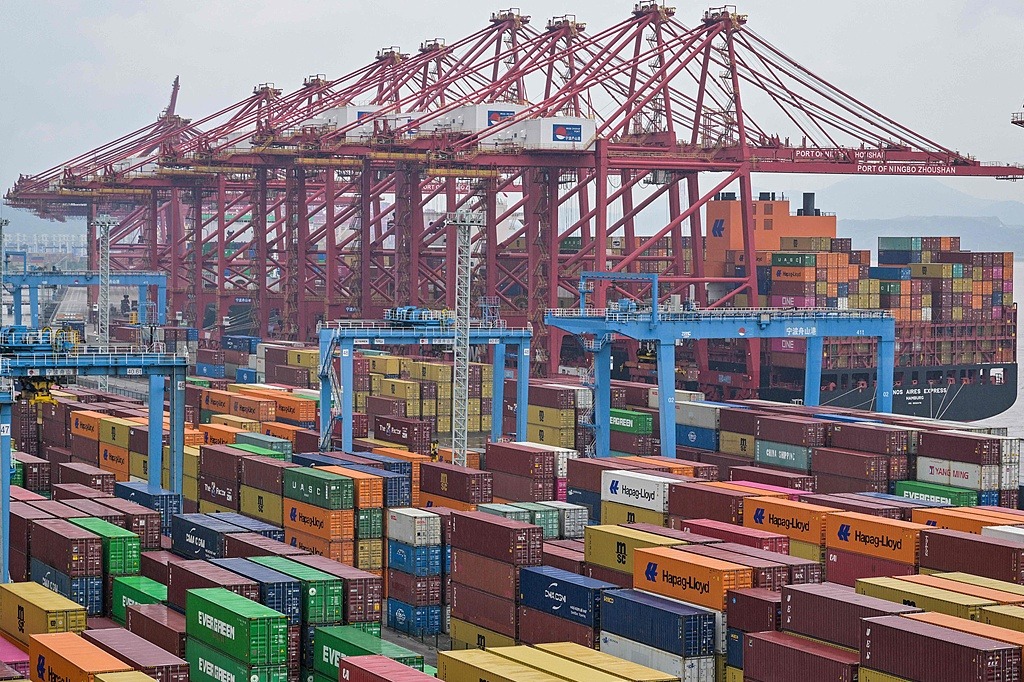'Freedom of navigation' sailing in Straits provocative


The is no legal basis for or definition of "international waters" in international law, so the Taiwan Straits cannot be called international waters, Chinese Foreign Ministry spokesman Wang Wenbin said at a regular news conference on June 13 in reply to a question by a Bloomberg journalist.
Wang was right, because "international waters" is not a defined term in international law. To varying degrees and depending on the location, all ocean waters are open, and in a country's territorial waters, ships of all countries enjoy the right of (mark the term) "innocent passage".
Some foreign media outlets have said that given the intensifying disputes between China and the United States on the Taiwan question, making clear the legal status of the Taiwan Straits will help both sides have a better understanding of reality and enable them to focus on the issues of importance during discussions. It will also set guardrails for Sino-US relations, especially on the Taiwan question, they said.
'International waters' not a legal term
The term "international waters" which the Bloomberg journalist used is not a formal legal term in the international law of the sea; it is used informally by some countries to refer to the "high seas".
The 1982 United Nations Convention on the Law of the Sea does not define "international waters", but in Part VII, titled "High Seas", Article 86 says: "The provisions of this Part apply to all parts of the sea that are not included in the exclusive economic zone, in the territorial sea or in the internal waters of a State, or in the archipelagic waters of an archipelagic State." Thus, the waters covered in the law of the sea include the high seas, exclusive economic zones, territorial seas, internal waters and archipelagic waters, but not "international waters".
Situated between the Chinese mainland and Taiwan island (that is, the mainland and islands of a country), the Taiwan Straits connects the East China Sea and the South China Sea. True, many international ships sail through the Straits. But it is incorrect of Ned Price, spokesman for the US Department of State, to say that the "Taiwan Straits is an international waterway", because Article 37 in Part III of the UNCLOS, titled "Straits Used for International Navigation", states: "This section applies to straits which are used for international navigation between one part of the high seas or an exclusive economic zone and another part of the high seas or an exclusive economic zone."
Geographical features clarify status of Straits
Since the UNCLOS only describes but does not give a clear definition of such a type of strait, the Taiwan Straits may be classified on the basis of its geographical characteristics and functionality. But the rule of navigation under this part does not apply in this case. According to Article 35, "Nothing in this Part affects the legal status of the waters beyond the territorial seas of States bordering straits as exclusive economic zones or high seas."
As Article 36 stipulates: "This Part does not apply to a strait used for international navigation if there exists through the strait a route through the high seas or through an exclusive economic zone of similar convenience with respect to navigational and hydrographical characteristics; in such routes, the other relevant Parts of this Convention, including the provisions regarding the freedoms of navigation and overflight, apply."
These provisions exclude the application of Part III of the convention to the Taiwan Straits. And due to the special situation of Taiwan, the Chinese mainland has so far only announced the baselines of the territorial waters of the mainland, the Xisha Islands and the Diaoyu Islands, but not the baselines of the territorial waters of the remaining places, including the Taiwan and Penghu islands.
Under the UNCLOS' provisions, "internal waters" means all waters on the landward side of the baseline of the territorial sea that form part of the territory of the state. The territorial sea extends to 12 nautical miles (22.22 kilometers) from the baseline of a coastal state. Within this zone, the airspace above the sea and the seabed and subsoil are part of the territory of the state which exercises full sovereignty over its internal waters and the territorial sea. The contiguous zone may not extend beyond 24 nautical miles from the baselines from which the breadth of the territorial sea is measured, but inside the zone the coastal state has control over customs, fiscal, immigration and sanitary matters.
Sovereignty over all internal waters
A state's exclusive economic zone is an area beyond and adjacent to the territorial sea, extending seaward to a distance of no more than 200 nautical miles from its coastal baseline. In the exclusive economic zone, the coastal state has sovereign rights "for the purpose of exploring and exploiting, conserving and managing the natural resources" and for "the economic exploitation and exploration of the zone", as well as jurisdiction that includes the building and use of artificial islands, installations and structures; marine scientific research; and protection and preservation of the marine environment.
The Taiwan Straits is about 70 nautical miles at its narrowest and about 220 nautical miles at its widest. Under the UNCLOS and Chinese law, the Taiwan Straits' waters comprise China's internal waters, territorial sea, contiguous zone and exclusive economic zone.
Also, states have different rights and obligations over different channels of waters, and different modes of navigation apply to different waters. For example, ships of all states, whether coastal or landlocked, enjoy the right of innocent passage through the territorial sea (Articles 17, 18 and 19); and according to Article 30," (I)f any warship does not comply with the laws and regulations of the coastal State concerning passage through the territorial sea and disregards any request for compliance therewith which is made to it, the coastal State may require it to leave the territorial sea immediately."
For another example, in a country's exclusive economic zone, all states enjoy freedom of navigation and overflight (Article 58). Similarly, Article 11 of the Chinese law that deals with exclusive economic zones and continental shelves states:" (A) ll states shall, on the premise that they comply with international law and the laws and regulations of the People's Republic of China, enjoy the freedom of navigation and overflight in its exclusive economic zone."
Who is breaking international rules?
When the final UN Convention on the Law of the Sea was presented in 1982, China was one of the first signatories. To date, more than 160 parties have signed it, with the United States being the most important exception. While there may be domestic political reasons for the US not joining the UNCLOS. But it is essentially its hegemonic mindset and pursuit of global maritime interests that has stopped it from signing the convention.
Incidentally, not being a party to the convention does not prevent the US from enjoying the rights the UNCLOS provides for other countries, but it does help it to circumvent its duties. For instance, the US can choose to ignore the convention's provision that" (t) he high seas shall be reserved for peaceful purposes" (Article 88), and in exclusive economic zones, "States shall have due regard to the rights and duties of the coastal State and shall comply with the laws and regulations adopted by the coastal State in accordance with the provisions of this Convention and other rules of international law insofar as they are not incompatible with this Part" (Article 58).
US warships have sailed through the Taiwan Straits on average once a month this year. Despite a large portion of the Straits falling within China's exclusive economic zone, the US has "freedom of navigation" but since the US is not a party to the UNCLOS, it can claim, without "regard to the rights and duties of the coastal State", that this represents the US' "commitment to a free and open Indo-Pacific region".
US freedom of navigation borders on provocation
Such freedom of navigation borders on provocation, not least because it supports Taiwan separatists and has been gradually hollowing out the "one China" principle that the US is obliged to adhere to according to the three Sino-US joint communiques it has signed. In fact, had it not been for the US' constant support for advocates of "Taiwan independence" for 70 years, the road to peaceful reunification across the Straits would not have been so tortuous.
In accordance with the UNCLOS and Chinese law, the Chinese government enjoys sovereignty and jurisdiction over the waters of the Taiwan Straits, although it respects the legitimate rights of other countries in these waters. If this question is deliberately manipulated using the false claim that China is violating the international law of the sea, China certainly needs to clarify what is right, and it has done so.
Courtesy: chinausfocus.com
The views don't necessarily represent those of China Daily.
The author is a research fellow at the China Institutes for Contemporary International Relations.
If you have a specific expertise, or would like to share your thought about our stories, then send us your writings at opinion@chinadaily.com.cn, and comment@chinadaily.com.cn.

































